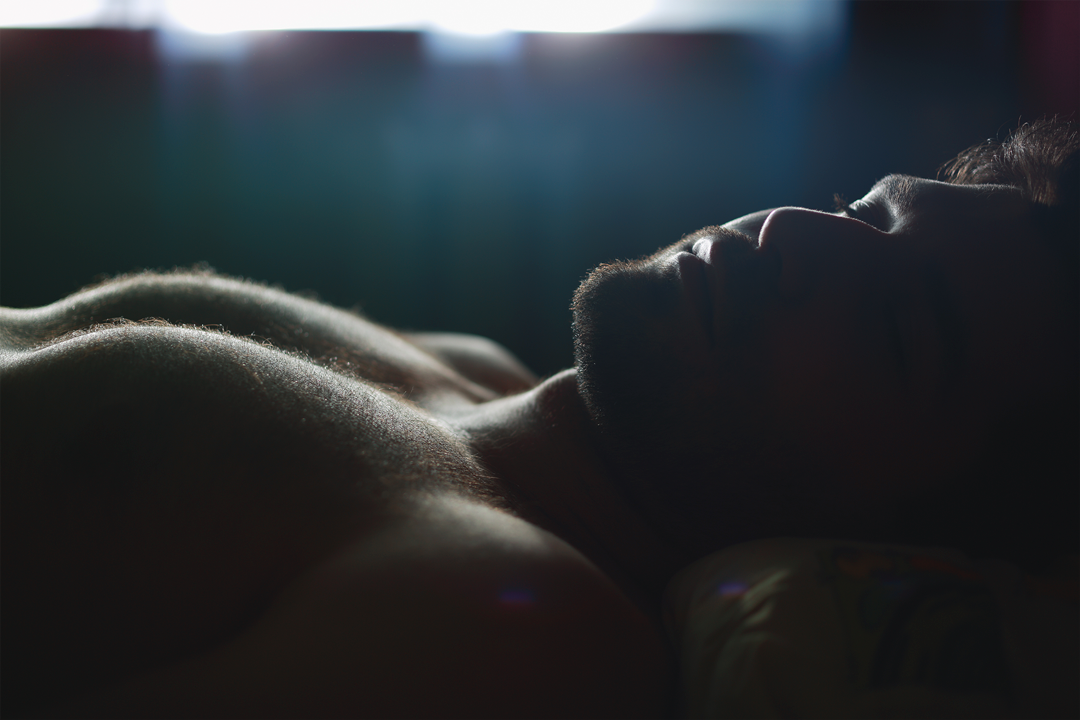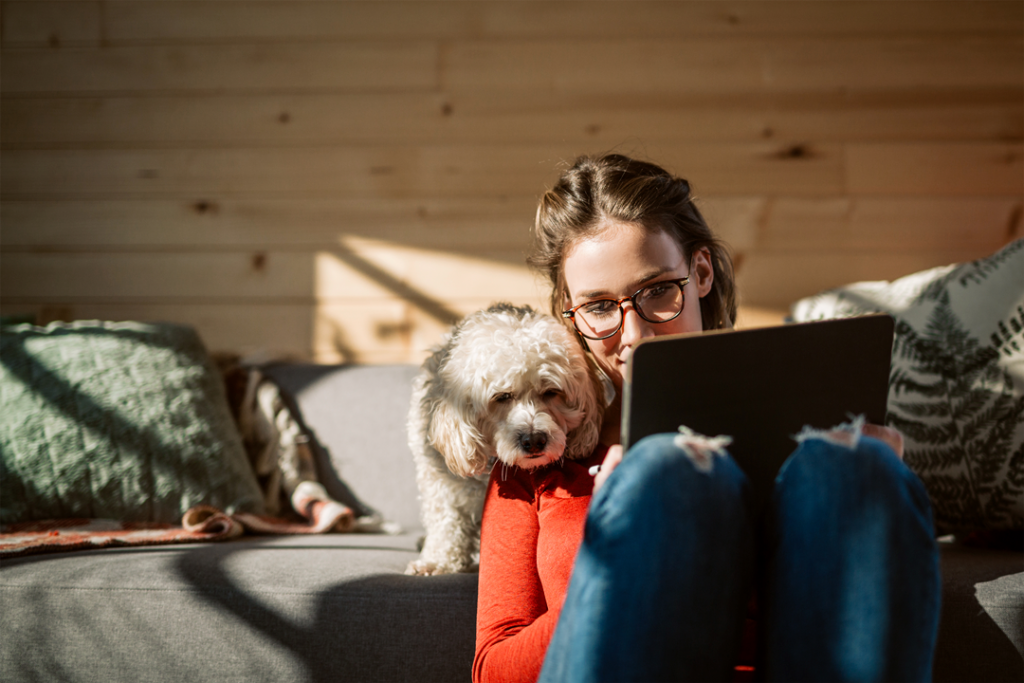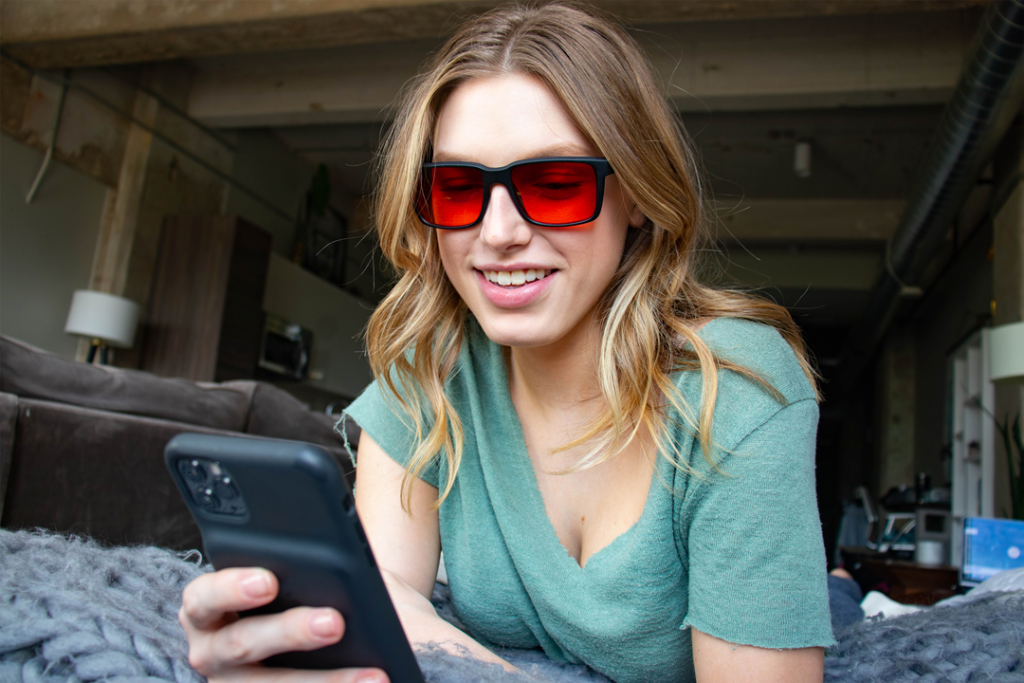ARTICLE
How to Increase Your Deep Sleep by 15%

Written by Siim Land
You may already be aware that blue light in the evening disrupts your body’s circadian rhythms and can reduce the quality of your sleep, but it can still be pretty hard to escape it. Between computers, TVs, smart phones and tablets, we’re surrounded and accustomed to the constant illumination of modern life. So, how bad is blue light at night for you really?

Blue Light 101
Blue light influences hormone secretion, heart rate, alertness, sleep, body temperature, and gene expression (1).
Sources of blue light include the Sun, artificial light sources like digital screens, smartphones, TVs, lamps, traffic signs, computers, fluorescent and LED lighting. Blue light exposure has a very important role in regulating your circadian rhythms and biological processes.
Unfortunately, because of technology and new gadgets, we’re getting exposed to more and bluer light for longer periods of time, which can promote obesity, depression, diabetes, cancer, neurological disorders and poor sleep.
Cover Your Eyes
Most of the circadian signaling is transmitted through the retinas through which blue light travels into the brain and stimulates the inner biological clock. However, it’s been shown how even shining some blue light on the back of your elbows or knees suppresses melatonin the sleep hormone. In fact, one study used a fMRI analysis to look at how exposure to dim light at night while sleeping affected the brain activity of 20 healthy men (2).
They found that:
- Exposure to 10-lux light for one night significantly decreased brain activity in the right hemisphere, which lowered their working memory performance as well.
- Exposure to 5-lux light didn’t have a significant effect but it still may have an indirect effect on cognition.
That’s some scary stuff to think about because sleep is such a crucial thing for your overall health and brain’s development. Suppressing melatonin because of blue light sneaking into your bedroom prevents your brain from repairing itself and can cause missing out on the most vital components of sleep.
Protect Your Sleep With Your Life
The invasion of artificial light into the darkness of night can be a big threat to human health and sleep and it’s not something you’d want to overlook.
Imagine how many people are suffering from suppressed melatonin by staying up late and exposing them to blue light in the evening. Their brain literally thinks its at the equator with the sun blazing on their head even though it’s 10 PM at night. My eyes…It takes several hours before melatonin can begin to rise again and by that time it may be too late…
Just to be clear: not ALL blue light is bad. Getting enough blue light during the morning parts of the day is also important for boosting your alertness. At night, however, exposure to blue light will suppress your body’s natural melatonin production and make you sleep worse. I’ve been using some blue blocking glasses for over a year and I noticed a significant improvement in my sleep quality if I wear them.
How I Increased My REM Sleep by as Much as 15%
A few weeks ago I bought theses night time TrueDark® glasses (with red lenses), and they block out absolutely all artificial light. They’re like these serious superhero goggles, and even though they look a little silly, they’re really amazing. I looked at the sleep data from my Oura ring and I gained about 10-15% more deep sleep every single night that I opted to wear the TrueDark® Twilight Classic sleep-hacking glasses. That’s like quite crazy to think about because I was already using glasses that blocked out most of the blue light, but apparently, it wasn’t enough.
Now imagine someone who’s not using any protective eye-wear, and they’re likely looking at computer screens or some other kind of digital device up until they go to bed. Their melatonin levels will be severely suppressed throughout the day (and night), causing their circadian rhythm to get all out of whack and make them feel completely fatigued the next day.
Beforehand, I was using some regular blue blocking glasses you can get from any online store. I was aware that they weren’t the highest of quality and I was fine with that. However, after wanting to take my sleep optimization to the next level, I was looking for the best protective eye-wear.

TrueDark® Glasses Review
Like I mentioned earlier, most circadian signaling gets transmitted through the eyes, which is why you’d want to protect them against artificial light in the evening. Unfortunately, most glasses don’t really filter out all of the junk light frequencies, which makes it more difficult for your body to produce melatonin naturally at night time.
- Common blue blocking glasses don’t cover the wavelengths that affect the production of melanopsin — not just blue light, but also green and violet light (3).
- TrueDark® Twilight Classic glasses use technology that filters out the wavelengths that stimulate melanopsin sensors — maximizing your sleep quality, performance, and health.
The TrueDark® Twilight glasses are a class of their own because they block out 98-100% of blue, green and violet light, depending on which Twilight style you choose. When I first wore them, I literally almost walked into walls like a blind bat. Be careful that you don’t trip over your dog when you wear them!
Overall, I’m very satisfied with the TrueDark® Twilight glasses and they’re definitely the best ones out on the market. The regular yellow-lensed blue blocking glasses can be worn during the earlier parts of the night or when you’re going out but the Twilight glasses are best worn about 30-90 minutes before bedtime — all depending on your individual biology and what stimulants you may have had earlier in the day.
Tips for Deep Sleep
Here are some additional tips for getting more deep sleep:
- Daylight Exposure – You want to set off a proper circadian rhythm in the morning by spending time outside for 10-15 minutes. Even if it’s cloudy, you’ll activate the circadian clock in your brain and get a better night’s sleep.
- Be Physically Active – If you’re exercising consistently, you’re going to make yourself more tired and yearn for better sleep.
- Eat Some Fat and Protein at Dinner – Foods high in tryptophan like turkey, eggs, salmon, pumpkin seeds help to produce serotonin the relaxation hormone.
- Stop Eating at Night – You want to stop food consumption at least 2-4 hours before going to bed. This is a pretty big one. Too much food sitting in your stomach prevents the body from repairing itself and falling into deep sleep.
- Red Light Therapy – Using a red light therapy device in the evening mimics the natural sunset and will promote melatonin the sleep hormone. I turn down all the blue lights in my house and immerse myself in red light for about 10-15 minutes.
- Wear Blue Blockers – I start wearing my blue blockers about 2 hours before bed, especially if I’m still watching screens or TV.
When I do stick to this routine, I sleep like a log, and I have the sleep data to prove it.
References
